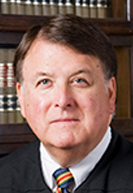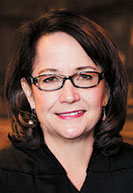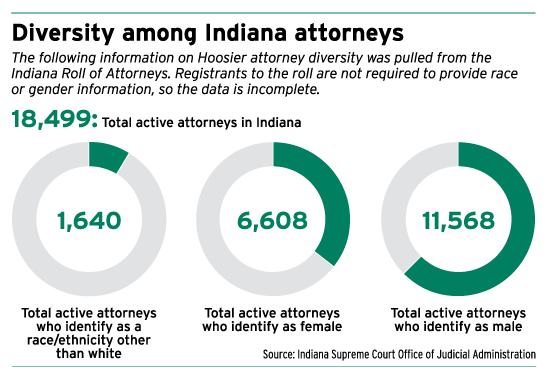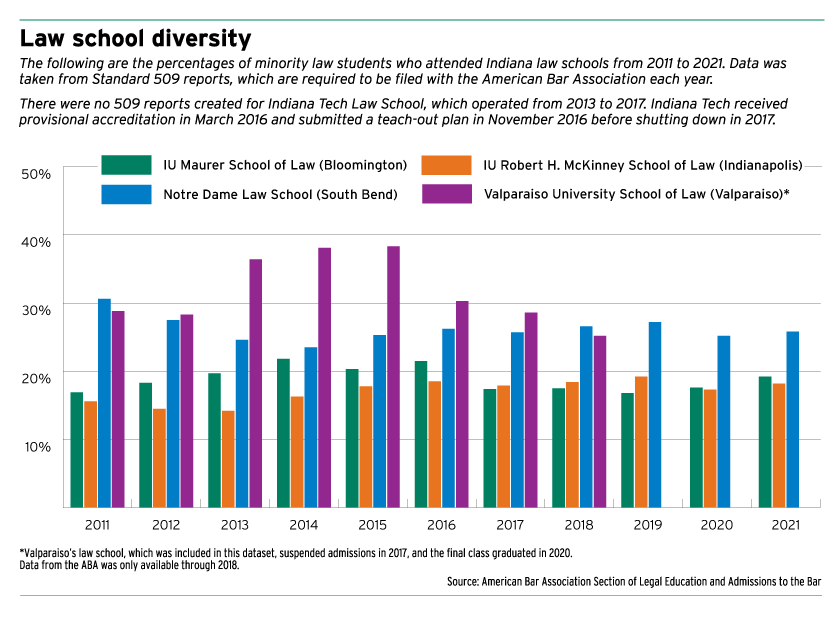Subscriber Benefit
As a subscriber you can listen to articles at work, in the car, or while you work out. Subscribe NowSpeaking to a crowd of attorneys, judges, justices, law professors and students inside the north atrium of the Indiana Statehouse, Chasity Thompson Osborn told those in attendance that the night’s celebration was “really just like a family reunion.”
On Sept. 29, dozens of Indiana Conference for Legal Education Opportunity fellows from the last quarter-century met in Indianapolis to celebrate 25 years of the program.
Thompson Osborn, director of attorney learning and development at Taft Stettinius & Hollister and a 1999 ICLEO fellow, emceed the event aimed at celebrating the program that has created opportunities for hundreds of lawyers with diverse backgrounds in Indiana.
Opening doors
The ICLEO program was established in 1997 to assist Indiana minority, low-income and educationally disadvantaged students in pursuing a law degree and a career in the Indiana legal community.

Former Indiana Chief Justice Randall Shepard is credited as the creator of ICLEO, as he urged the Indiana Legislature to create the program while he was on the high court bench, including during his 1997 State of the Judiciary address in which he called on Hoosier lawmakers to pass a bill after a federally funded CLEO program was eliminated in 1996.
Speaking at last month’s anniversary celebration, Shepard recalled how then-Senate President Pro Tempore Robert D. Garton allowed a vote on the bill, which was written by Reps. Jesse Villalpando and Earl Hams, after the 8 p.m. deadline on the final day of the legislative session. According to Shepard, the bill passed the Indiana House 91-7 and the Senate 49-0 before then-Gov. Frank O’Bannon signed it into law.
Former Indiana justice and current Indiana University Robert H. McKinney School of Law professor Frank Sullivan said when he talks to groups about leadership, he mentions Shepard’s push for ICLEO.
“…. (The) full magnitude of Chief Justice Shepard’s leadership did not strike me until several years later when I was having a conversation with the chief justice of another state — a state, by the way, much bluer than ours,” Sullivan said during a recent speech. “This chief justice told me that if this chief justice had made that request of the state Legislature in this chief justice’s state, the chief justice would’ve been ‘laughed out of the room.’
“… Of course,” Sullivan continued, “Chief Justice Shepard could very well have been laughed out of the room on that day in January in 1997, but because he was willing to fearlessly take a stand for what he believed in, our profession and our state are measurably better off.”
Pursuant to Indiana Code § 33-24-13-7, $625,000 is appropriated each fiscal year to ICLEO from the state general fund via the Indiana Supreme Court.
Each summer, students go through an intense, residential preparatory experience on an Indiana law school campus via ICLEO that is designed to help them through law school and, in turn, increase diversity in the Indiana legal community. Participants are immersed in first-year law school curriculum and skills courses designed to closely simulate the law school experience.
Participants who successfully complete the ICLEO summer institute and then enroll in an American Bar Association-accredited Indiana law school in the fall semester are certified as ICLEO fellows and receive a $4,800 fellowship award each semester for up to three years, to a maximum of $28,800 to offset the cost of tuition.

At the celebration, current Indiana Chief Justice Loretta Rush said around $20 million in Hoosier tax dollars has been spent on the ICLEO program since 1997, and there have been around 670 ICLEO fellows.
According to the Indiana Roll of Attorneys, there are currently 18,499 active attorneys in the state. While attorneys aren’t required to report their gender or ethnicity when they register, there are at least 1,640 lawyers in the state who identify as a race/ethnicity other than white.
During her speech, Rush said the number of attorneys of color was about 1,200 five years ago.
“My hope is that ICLEO continues to grow and grow and grow and then sometime we won’t need ICLEO because we’re there, (we) reached all those goals,” Rush said. “… It just becomes just part of the fabric of our profession that we’ve got just beautiful diversity.”
As of Oct. 3, ICLEO has a new director: Phyllisia Gant. Gant, who replaces Kendra Key, will provide attorney support to the Coalition for Court Access and the Commission on Equity and Access in addition to her ICLEO duties.
Continued support
Fellows from the first class of ICLEO in 1997 through 2021 were in attendance at the Statehouse for the 25th anniversary celebration.
During presentations, Charise Frazier, shareholder at Hall Render and a 1997 ICLEO fellow, reflected on her time in the program and how it has impacted her life since.
“Being a part of that first class was fun, and we had a lot of good times at Bloomington,” Frazier said, referring to the summer institute at Indiana University Maurer School of Law in Bloomington. “We were getting to know each other, we were learning about the law, and I really walked away from that summer institute with an outstanding group of colleagues and several lifelong friends, even friends who are in my wedding.”
Marion Superior Judge Ryan Gardner, a 2004 Indiana University Robert H. McKinney School of Law graduate and ICLEO fellow who is currently a finalist for a vacancy on the Court of Appeals of Indiana, recalled his time during the summer institute at Notre Dame Law School.
“We learned how to brief cases, and so while everyone was running around like a chicken with their head cut off during our first year of law school … we already knew how to do it, because we had learned it over the summer,” Gardner said. “It gave us a huge leg up going into the unknown with law school.”
Kat Bingaman, a 2021 ICLEO fellow and current IU Maurer student, called the program “critical” to the success of many law students.
“It’s not just about, you know, social and economic class … it’s about coming from a background where you don’t have that opportunity,” Bingaman said.
Karen Bravo, dean of IU McKinney, who was in attendance during the event, said that seeing all the ICLEO fellows together was “tremendous” and that the program is a testament to the vision of Shepard and those who have kept the program going over the years.
“I hope that it continues, but we also hope that at some point, it’s not necessary, that the structural barriers will be such that everyone who applies to law school, everyone who applies to college, they’re on an even footing,” said Bravo, the first woman of color to serve as dean of the Indianapolis law school.
IU Maurer Interim Dean Christiana Ochoa, the law school’s first Latina and first person of color to hold a decanal title, likewise called ICLEO “critical.”
“It’s a great way to enhance the diversity of our incoming classes and of the legal profession in Indiana generally,” Ochoa said. “And so I think it’s been a fabulous program not just for the law school, but also for the entire state of Indiana, because it has really helped to enhance the diversity of the legal profession. •
Please enable JavaScript to view this content.



